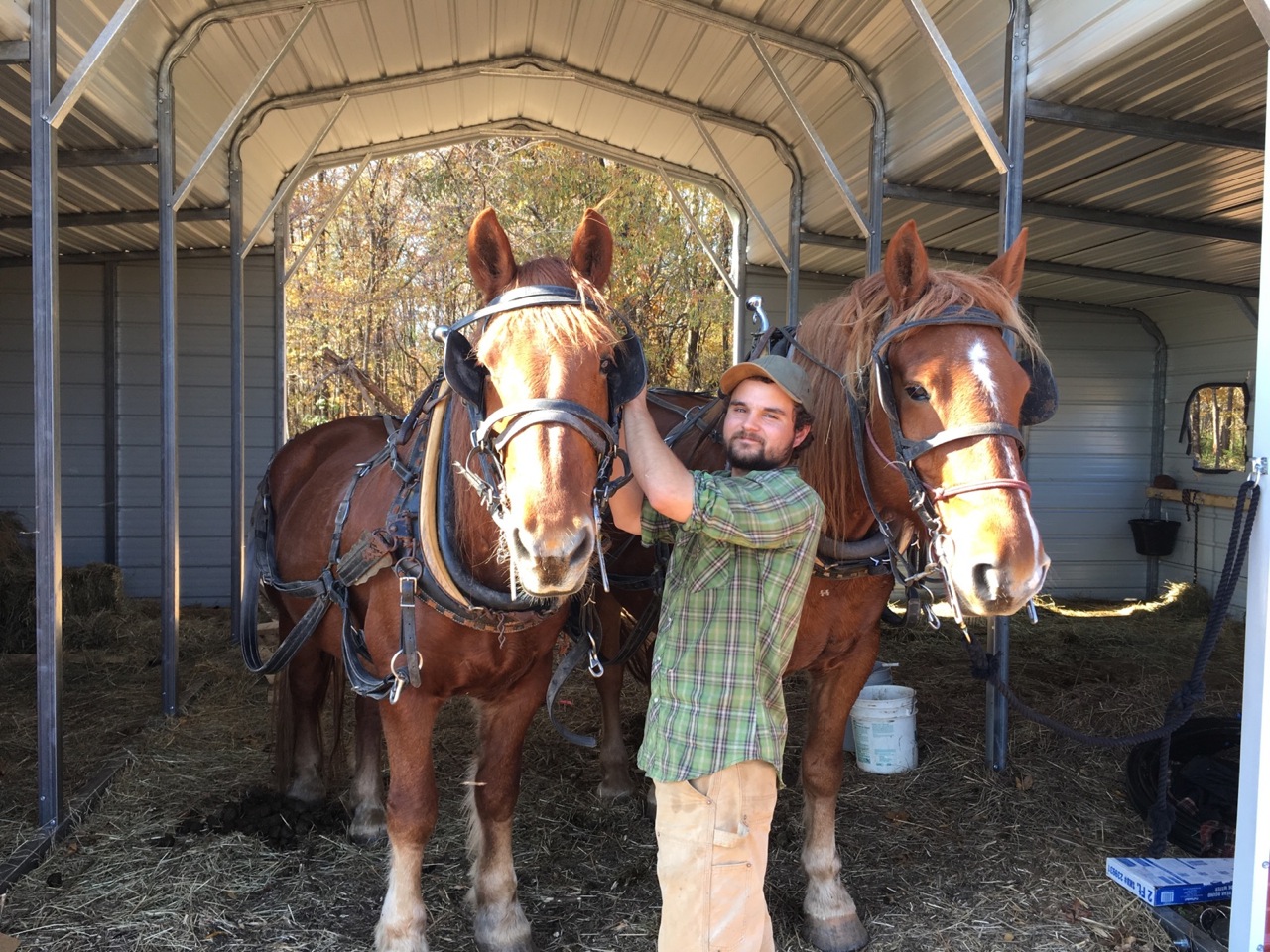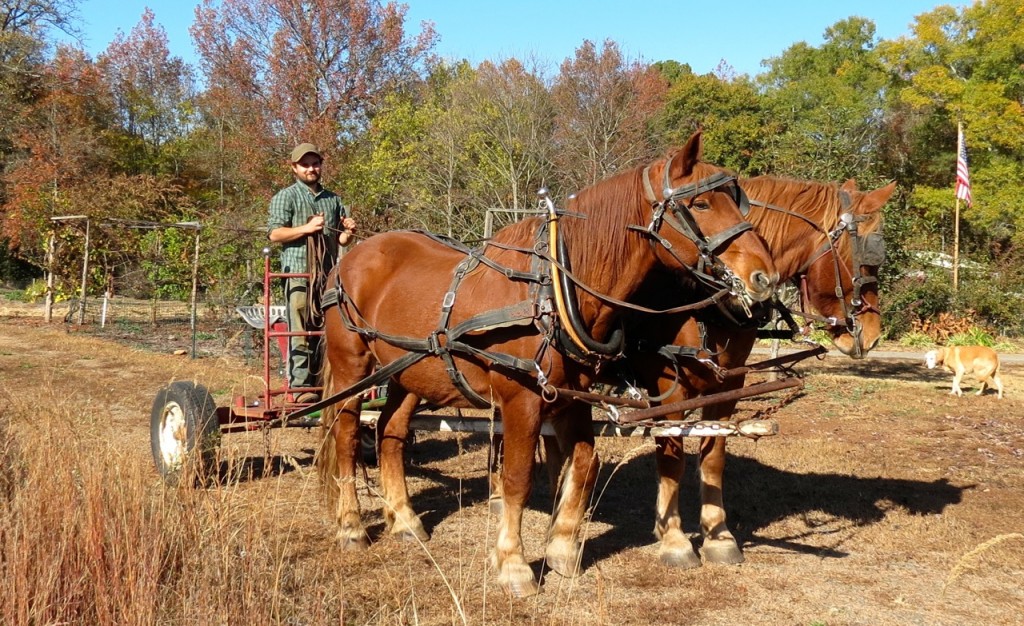
By CFSA Members Nancy and Ron Bryant of 3 Eagles Sanctuary and Holt Akers-Campbell of Lazy Heron Farm
As communities continue to yearn for fresh, local produce and farmers search for methods that are kind to the land and our environment, a revival in draft animal power is taking hold among some small-scale farmers.
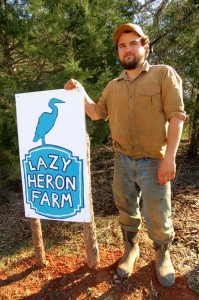 Lazy Heron Farm, a CFSA member and new vegetable farm in Norwood, NC, has joined this group of producers who prefer the gentle rhythms of horses’ hooves to the exhaust of tractors. Sunny and Kate, the farm’s two Suffolk Punch drafts, have begun working up soil which will yield a wide variety of vegetables come spring for a Community Supported Agriculture (CSA) program, farmers markets, and local stores and restaurants.
Lazy Heron Farm, a CFSA member and new vegetable farm in Norwood, NC, has joined this group of producers who prefer the gentle rhythms of horses’ hooves to the exhaust of tractors. Sunny and Kate, the farm’s two Suffolk Punch drafts, have begun working up soil which will yield a wide variety of vegetables come spring for a Community Supported Agriculture (CSA) program, farmers markets, and local stores and restaurants.
Farmer Holt Akers-Campbell arrived at 3 Eagles Sanctuary, south of Norwood, this fall, although the project has deeper roots. About six years ago, landowners Ron and Nancy Bryant began to think about creative ways to use part of their agricultural land at 3 Eagles Sanctuary to produce food for local markets.
“At first we considered an incubator farm for the tri-county region, much like Lomax Farm [CFSA’s incubator farm in Concord where aspiring farmers learn how to grow food sustainably as a small business],” said Nancy. “But the project evolved into the Upper Pee Dee Farm and Food Council with a mission to educate the public about local, sustainable food.”
Still left with the question of how to manage their field, the Bryants seeded the land annually with a variety of cover crops to nourish and enrich the soil in preparation for a young farmer to establish a small, sustainable farm.
Last spring, The LandTrust for Central North Carolina contacted the Bryants with an inquiry from Holt about his desire to establish his farm in North Carolina. After a series of conversations and a weekend meeting, the connection was made.
Like many young people choosing to farm as a career today, Holt did not grow up on a farm. Raised in Tennessee, he graduated Phi Beta Kappa from Wesleyan University in Connecticut, where he worked on the student-run market garden and completed his degree with a 200-page thesis on livestock raising during Roman times. After finding a passion in growing food as a teen, Holt began years of apprenticeship on farms in Tennessee, Vermont, and Maine, where he worked under experienced vegetable growers.
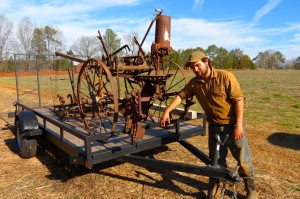 Wanting to come to North Carolina to farm near relatives, his dream of his own farm is unfolding in Stanly County.
Wanting to come to North Carolina to farm near relatives, his dream of his own farm is unfolding in Stanly County.
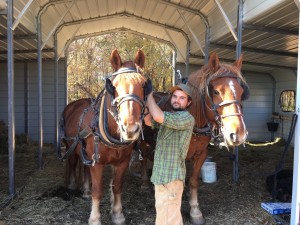 “My use of draft horses is an intentional, humbling choice which forces me to recognize nature’s rhythms,” said Holt. “Horses are light on the soil, fueled by grass, and what comes out the back end turns into compost that enriches the soil. It’s also just fun. I get enough time around machines. Tractors are easier in some ways, but it’s nice to have to pay attention to a living being.”
“My use of draft horses is an intentional, humbling choice which forces me to recognize nature’s rhythms,” said Holt. “Horses are light on the soil, fueled by grass, and what comes out the back end turns into compost that enriches the soil. It’s also just fun. I get enough time around machines. Tractors are easier in some ways, but it’s nice to have to pay attention to a living being.”
The choice to use grass-fueled horses is coupled with a strict avoidance of agrochemicals. The farm strives to keep pests and disease in balance by maintaining a healthy plant environment through good soil structure, high organic matter content, and specified insect habitat around the fields. No synthetic fertilizers, herbicides or pesticides are ever used.
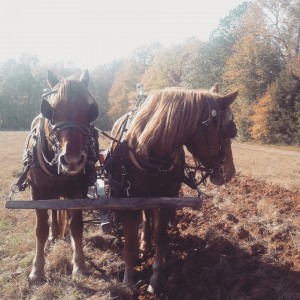
The farm also embraces the relatively new and growing phenomenon of Community Supported Agriculture, a way for communities to feed themselves by connecting farmers directly with consumers. Sales will begin this spring through the CSA, as folks sign up to receive a weekly allotment of fresh vegetables, with the option to pick up at the farm in Norwood or in Albemarle. The Lazy Heron CSA differs from some others in that there are no requirements of what to take: with three shares sizes available, members fill a bag each with a number of vegetable items of their choosing from a wide selection. The 26-week long program begins in May and ends in November.
More information can be found at www.lazyheronfarm.com.


